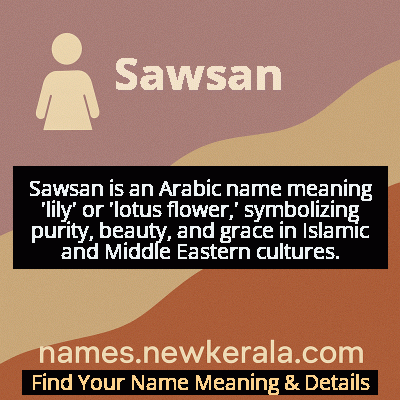Sawsan Name Meaning & Details
Origin, Popularity, Numerology Analysis & Name Meaning of Sawsan
Discover the origin, meaning, and cultural significance of the name SAWSAN. Delve into its historical roots and explore the lasting impact it has had on communities and traditions.
Name
Sawsan
Gender
Female
Origin
Muslim
Lucky Number
5
Meaning of the Name - Sawsan
Sawsan is an Arabic name meaning 'lily' or 'lotus flower,' symbolizing purity, beauty, and grace in Islamic and Middle Eastern cultures.
Sawsan - Complete Numerology Analysis
Your Numerology Number
Based on Pythagorean Numerology System
Ruling Planet
Mercury
Positive Nature
Adventurous, dynamic, curious, and social.
Negative Traits
Restless, impatient, inconsistent, prone to indulgence.
Lucky Colours
Green, white.
Lucky Days
Wednesday.
Lucky Stones
Emerald.
Harmony Numbers
1, 3, 9.
Best Suited Professions
Sales, marketing, travel, entertainment.
What People Like About You
Versatility, charisma, adventurous spirit.
Famous People Named Sawsan
Sawsan Badr
Actress
Celebrated Egyptian actress with extensive filmography and multiple awards
Sawsan Ghanem
Singer
Influential Sudanese vocalist known for musical innovation
Sawsan Al-Sha'er
Academic
Pioneering Kuwaiti educator and women's rights advocate
Sawsan Jamil
Journalist
Distinguished Lebanese journalist with international recognition
Name Variations & International Equivalents
Click on blue names to explore their detailed meanings. Gray names with will be available soon.
Cultural & Historical Significance
In contemporary Muslim societies, Sawsan represents a connection to cultural heritage while maintaining modern relevance. The name appears frequently in Islamic literature and is often chosen by parents who value both traditional meanings and contemporary appeal. During the 20th century, the name became associated with educated, modern Muslim women who balanced traditional values with professional ambitions. This dual identity makes Sawsan particularly significant in diasporic communities where maintaining cultural connections is important. The name's floral origin also aligns with Islamic teachings that encourage appreciation of nature's beauty as a reflection of divine creation. Many Muslim scholars note that names derived from nature, like Sawsan, help cultivate an appreciation for Allah's creation from childhood.
Extended Personality Analysis
Women named Sawsan are often perceived as embodying the delicate yet resilient qualities of their namesake flower. They typically display a gentle, compassionate nature combined with inner strength and determination. Like the lily of the valley that thrives in shaded environments, Sawsans often possess quiet confidence and the ability to flourish in challenging circumstances. They tend to be highly intuitive and emotionally intelligent, with a natural ability to understand and comfort others. Many Sawsans are known for their diplomatic skills and ability to resolve conflicts peacefully, often serving as mediators in family or professional settings. Their personality often combines traditional values with modern thinking, making them adaptable to different social contexts. While they may appear reserved initially, Sawsans typically form deep, lasting relationships and are fiercely loyal to those they care about.
In professional environments, Sawsans often excel in roles that require attention to detail, creativity, and interpersonal skills. They frequently gravitate toward careers in education, healthcare, arts, or community service where their nurturing qualities can be fully expressed. The name's association with the lily of the valley—a plant known for spreading steadily and creating beautiful ground cover—often reflects in Sawsans' approach to life: they make consistent progress rather than seeking flashy achievements. Many people named Sawsan develop strong aesthetic sensibilities and appreciate beauty in their surroundings, whether through art, music, or nature. Their balanced personality typically includes both practical wisdom and romantic idealism, allowing them to navigate life's challenges while maintaining hope and appreciation for life's beauty. This combination of traits makes Sawsans particularly effective in bringing people together and creating harmonious environments.
Modern Usage & Popularity
In contemporary naming practices, Sawsan maintains its cultural significance while adapting to modern global contexts. The name continues to be popular in Arab countries like Egypt, Lebanon, Jordan, and Syria, though its usage has become more selective rather than overwhelmingly common. Among Muslim diaspora communities in Western countries, Sawsan serves as a cultural anchor—a name that honors heritage while being distinctive enough to stand out. Modern parents often choose Sawsan for its elegant sound, natural meaning, and cross-cultural accessibility. The name has maintained steady popularity rather than experiencing dramatic spikes or declines, indicating its timeless appeal. In digital era, the name appears frequently on social media platforms, with many young Sawsans creating content that bridges their cultural background with contemporary interests. The name's moderate popularity makes it familiar without being overly common, which many modern parents find appealing. Recent trends show that Sawsan is often paired with more contemporary middle names, creating combinations that honor tradition while embracing modernity. The name's continued relevance demonstrates how traditional Arabic names can maintain their appeal across generations and geographical boundaries.
Symbolic & Spiritual Meanings
The symbolic meanings associated with Sawsan are deeply rooted in the characteristics of the lily of the valley flower and its cultural interpretations across civilizations. Primarily, the name symbolizes purity and innocence, as the white blossoms of the lily of the valley have long represented chastity and spiritual cleanliness in various traditions. The flower's downward-facing bells are often interpreted as symbols of humility and modesty—qualities highly valued in many cultures. In the context of renewal and rebirth, the lily of the valley's early spring blooming pattern makes it a powerful symbol of new beginnings and the return of happiness after difficult times. The plant's medicinal properties in traditional herbalism add layers of meaning related to healing and protection. In many European folk traditions, lilies of the valley were believed to protect gardens from evil spirits and bring good luck to households. The flower's sweet fragrance, which seems disproportionate to its small size, symbolizes the idea that true worth and influence aren't always visible at first glance. In romantic symbolism, the lily of the valley represents the sweetness of love and the happiness of union. These multifaceted symbolic meanings make Sawsan a name that carries profound positive connotations of purity, renewal, protection, love, and the quiet power of nature's beauty.

